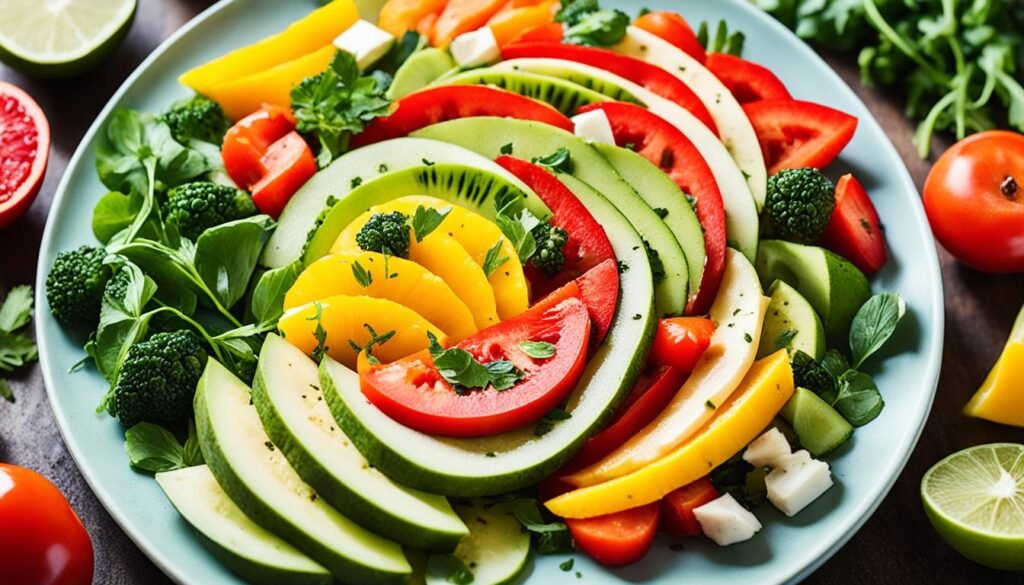If you’ve dealt with irritable bowel syndrome (IBS), you know how crucial it is to find tasty, gut-friendly meals. That’s why I’m thrilled to share 8 delicious low-FODMAP recipes. These dishes are great for managing IBS symptoms and boosting your digestive health. They’re perfect whether you’re on a strict low-FODMAP diet or just want to eat better for your gut.
This collection of low-FODMAP feasts includes everything from main courses to salads and snacks. Say hello to meals that make you feel good, not bloated or uncomfortable. These IBS-friendly recipes are sure to become staples in your gut health recipes collection.
Key Takeaways
- Discover 8 delicious and easy-to-make low-FODMAP recipes that are perfect for managing IBS symptoms.
- Learn how to nourish your gut and promote digestive wellness with these flavorful anti-inflammatory meals.
- Enjoy gluten-free recipes and dietary fiber recipes that will leave you feeling satisfied and energized.
- Explore tummy-soothing cuisine that is perfect for gut-friendly dishes.
- Get inspired to create low-FODMAP feasts that will have your taste buds and your tummy thanking you.
Understanding the Low-FODMAP Diet
Before we explore tasty low-FODMAP recipes, let’s get to know the basics of this diet. FODMAP stands for Fermentable Oligosaccharides, Disaccharides, Monosaccharides, and Polyols. These are short-chain carbs that some people find hard to digest. This can lead to symptoms like bloating, gas, and stomach pain.
What are FODMAPs?
FODMAPs are in many foods, like wheat, dairy, fruits, veggies, and some sweeteners. A low-FODMAP diet limits or cuts out these foods. This can help people with Irritable Bowel Syndrome (IBS) feel better and improve their gut health.
Benefits of a Low-FODMAP Diet for IBS
The low-FODMAP diet is well-studied and proven to help with IBS symptoms. It reduces foods hard to digest. This can ease bloating, gas, stomach pain, and other issues linked to IBS.
It also supports digestive wellness and is part of an anti-inflammatory diet for better gut health.
8 Delicious and Gut-Friendly Recipes
I’m thrilled to share eight tasty low-FODMAP recipes that are good for your gut. These IBS-friendly recipes, gut-friendly meals, and anti-inflammatory dishes help your digestive wellness. They also give you the dietary fiber your body needs.
Try these tummy-soothing cuisine options. They have gut-healing ingredients and are perfect for a happy, healthy gut.
- Roasted Salmon with Lemon and Dill
- Quinoa and Spinach Stuffed Chicken Breasts
- Grilled Pineapple and Coconut Salad
- Zucchini Noodles with Pesto and Shrimp
- Baked Sweet Potato Fries with Avocado Dip
- Lentil and Kale Soup
- Grilled Chicken and Vegetable Skewers
- Blueberry and Almond Overnight Oats
These IBS-friendly recipes are made to nourish your body and satisfy your taste buds. They’re also comforting. Enjoy these gut-friendly meals and see how they improve your digestive health and wellness.
“Eating well-balanced, anti-inflammatory dishes that are rich in dietary fiber can make a significant difference in managing IBS symptoms and promoting digestive wellness.”
Low-FODMAP Feasts: 8 IBS-Friendly Recipes for Happy Tummies
Living with Irritable Bowel Syndrome (IBS) can be tough, but finding the right recipes can make a big difference. I’m excited to share 8 delicious low-FODMAP meals that are great for your gut and packed with anti-inflammatory ingredients. These recipes support your digestive health and taste amazing.
These recipes range from a creamy chicken and vegetable stew to a fresh quinoa salad. They’re all IBS-friendly and designed to make your taste buds happy. Whether you want a hearty main dish or a light side, these dishes are easy to make and gentle on your stomach.
- Grilled Salmon with Roasted Sweet Potatoes and Asparagus
- Creamy Chicken and Vegetable Stew
- Quinoa Salad with Cucumber, Tomatoes, and Feta
- Roasted Butternut Squash Soup
- Baked Cod with Lemon and Dill
- Sautéed Spinach and Garlic
- Gluten-Free Pesto Zucchini Noodles
- Grilled Chicken Skewers with Bell Peppers and Onions
Try these low-FODMAP feasts and enjoy eating meals that are good for your gut. You’ll feel your tummy thanking you. Bon appétit!

Essential Ingredients for Low-FODMAP Cooking
Creating tasty low-FODMAP meals means picking ingredients that are good for your gut. If you have irritable bowel syndrome (IBS) or other digestive issues, it’s key to fill your pantry with foods that help your gut. These foods will be the base for dishes that fight inflammation.
Low-FODMAP Pantry Essentials
For making a variety of low-FODMAP dishes, add these important items to your kitchen:
- Gluten-free grains like quinoa, brown rice, and gluten-free oats
- Lactose-free dairy alternatives such as almond milk, coconut yogurt, and lactose-free cheese
- Fresh or frozen vegetables like spinach, carrots, zucchini, and bell peppers
- Low-FODMAP fruits like blueberries, oranges, and bananas
- Healthy fats from olive oil, avocado, and nuts (in moderation)
- Herbs and spices such as basil, ginger, and turmeric to add flavor without irritating your gut
- Protein sources like eggs, chicken, and tofu
With these low-FODMAP ingredients, you can make meals that are good for your gut. These meals will feed your body and calm your digestive system.
“Eating a low-FODMAP diet can be a game-changer for those with IBS, helping to identify and avoid trigger foods that cause uncomfortable symptoms.”
Meal Planning and Prepping for IBS
Following a low-FODMAP meal prep routine can greatly help with gut health. It’s all about a bit of planning and prep work. This way, you can enjoy tasty meals that are easy on your stomach. I’ll share some top tips for making a meal plan and prepping ingredients ahead.
First, planning your meals is crucial. Spend some time at the start of the week to plan out your meals. Make sure to include low-FODMAP options for breakfast, lunch, and dinner. This ensures you get the right balance of proteins, carbs, and foods that help your gut.
- Begin by listing your favorite IBS-friendly ingredients, like gluten-free grains, lean proteins, and low-FODMAP fruits and veggies.
- Use this list to create a weekly meal plan with a mix of dishes, from salads to one-pot meals.
- Remember to include snacks and side dishes too, so you have many choices throughout the day.
Then, set aside time for low-FODMAP meal prep. Chop veggies, cook proteins ahead, and portion ingredients. This saves time and stress later in the week. It also makes putting together meals easy and quick.
With some planning and a stocked low-FODMAP pantry, eating for IBS can be easy. Enjoy the benefits of better digestion and gut health by embracing this process.
Tips for Dining Out with IBS
When you have IBS, eating out can be hard. But, with some smart tips, you can still enjoy meals out without discomfort. I’ll share my best advice for picking menu items, talking to servers, and finding foods that are good for your gut.
Restaurant Strategies for a Happy Tummy
Eating out with IBS means planning ahead, but it doesn’t mean you can’t have fun. Here are my top tips for eating out with IBS:
- Do your homework before you go. Find restaurants that have low-FODMAP options or are known for serving foods good for your gut.
- Talk to your server about your diet. Let them know what you can and can’t eat. Most places will make changes for you.
- Choose simple, whole foods. Grilled meats, steamed veggies, and gluten-free grains are usually safe choices.
- Avoid sauces and dressings. They often have high-FODMAP ingredients. Ask for them on the side or find a low-FODMAP alternative.
- Drink water and eat slowly. Staying hydrated and eating in moderation can help prevent stomach issues.
With a bit of planning and talking to your server, you can enjoy eating out without IBS symptoms. Making smart choices lets you enjoy tasty meals without hurting your gut health.

Gut-Healing Supplements and Probiotics
Alongside a low-FODMAP diet, adding digestive supplements and probiotics can help your gut health. These aids work well with your low-FODMAP meals to improve gut function and keep your stomach happy.
Digestive supplements are key for easing IBS symptoms and fighting inflammation. Fiber supplements like psyllium husk or methylcellulose help with bowel movements and add dietary fiber for healthy digestion. Enzymatic supplements with lactase or alpha-galactosidase break down hard-to-digest carbs, cutting down on gas and bloating.
Gut-friendly probiotics are great for people with IBS. Strains like Lactobacillus and Bifidobacterium help manage IBS symptoms, boost gut health, and lessen inflammation. Choose probiotic supplements with a mix of these beneficial strains.
“Incorporating both digestive supplements and probiotics into my low-FODMAP lifestyle has been a game-changer for my gut health and IBS management.”
Exploring gut-healing supplements and probiotics lets you actively support your digestive health. This can lead to lasting relief from IBS symptoms.
Lifestyle Adjustments for Digestive Wellness
Managing IBS goes beyond just diet and supplements. It’s key to look at your lifestyle too. Regular exercise, stress management, and good sleep can help your diet work better. Together, they support your digestive wellness and gut health. This holistic approach helps manage IBS and ease symptoms.
Exercise: Movement for a Happier Gut
Exercise is great for your gut health. It cuts down on inflammation, boosts circulation, and helps with bowel regularity. Try to do at least 30 minutes of moderate exercise, like walking, swimming, or yoga, most days.
Stress Management: Calming the Mind, Soothing the Gut
Stress can really hurt your gut health and make IBS worse. Using stress-reducing activities, like meditation or deep breathing, can calm your mind and support an anti-inflammatory lifestyle. Try different methods to see what helps you the most.
Sleep: The Foundation of Digestive Wellness
Good sleep is crucial for digestive wellness. Aim for 7-9 hours of sleep each night and stick to a regular sleep schedule. Make your bedroom a calm place and follow good sleep habits, such as avoiding screens and caffeine before bed.
Adding these lifestyle changes to your IBS management plan helps support your gut health and long-term digestive wellness.
Conclusion
The low-FODMAP diet is a great way to handle Irritable Bowel Syndrome and boost your digestive health. This article shared 8 tasty and gut-friendly recipes for you to try. These meals can help feed your body and calm your stomach.
Don’t forget to also focus on exercise, managing stress, and getting good sleep. These lifestyle changes can help your digestive health even more.
With these tips, you can start a journey to better gut health and a happier digestive system. Eating low-FODMAP foods and focusing on digestive wellness can make your life better overall.
The recipes here are simple to make and packed with anti-inflammatory ingredients. Adding these dishes to your meals can help soothe your stomach and support your gut health. This way, you can actively work on managing your IBS symptoms and improving your digestive system.



